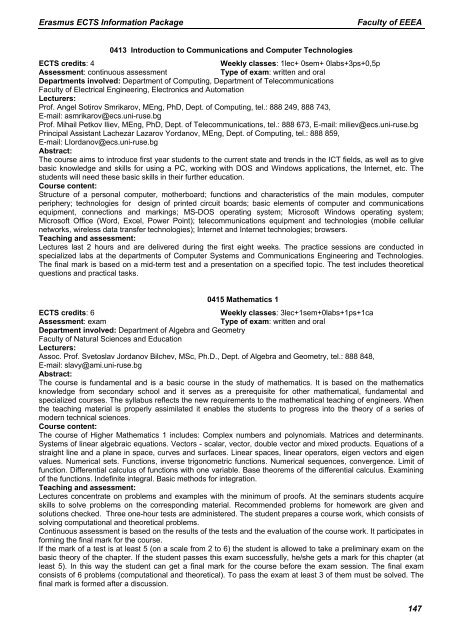Erasmus ECTS Information Package
Erasmus ECTS Information Package
Erasmus ECTS Information Package
Create successful ePaper yourself
Turn your PDF publications into a flip-book with our unique Google optimized e-Paper software.
<strong>Erasmus</strong> <strong>ECTS</strong> <strong>Information</strong> <strong>Package</strong><br />
Faculty of EEEA<br />
0413 Introduction to Communications and Computer Technologies<br />
<strong>ECTS</strong> credits: 4<br />
Weekly classes: 1lec+ 0sem+ 0labs+3ps+0,5p<br />
Assessment: continuous assessment<br />
Type of exam: written and oral<br />
Departments involved: Department of Computing, Department of Telecommunications<br />
Faculty of Electrical Engineering, Electronics and Automation<br />
Lecturers:<br />
Prof. Angel Sotirov Smrikarov, MEng, PhD, Dept. of Computing, tel.: 888 249, 888 743,<br />
E-mail: asmrikarov@ecs.uni-ruse.bg<br />
Prof. Mihail Petkov Iliev, MEng, PhD, Dept. of Telecommunications, tel.: 888 673, E-mail: miliev@ecs.uni-ruse.bg<br />
Principal Assistant Lachezar Lazarov Yordanov, MEng, Dept. of Computing, tel.: 888 859,<br />
E-mail: LIordanov@ecs.uni-ruse.bg<br />
Abstract:<br />
The course aims to introduce first year students to the current state and trends in the ICT fields, as well as to give<br />
basic knowledge and skills for using a PC, working with DOS and Windows applications, the Internet, etc. The<br />
students will need these basic skills in their further education.<br />
Course content:<br />
Structure of a personal computer, motherboard; functions and characteristics of the main modules, computer<br />
periphery; technologies for design of printed circuit boards; basic elements of computer and communications<br />
equipment, connections and markings; MS-DOS operating system; Microsoft Windows operating system;<br />
Microsoft Office (Word, Excel, Power Point); telecommunications equipment and technologies (mobile cellular<br />
networks, wireless data transfer technologies); Internet and Internet technologies; browsers.<br />
Teaching and assessment:<br />
Lectures last 2 hours and are delivered during the first eight weeks. The practice sessions are conducted in<br />
specialized labs at the departments of Computer Systems and Communications Engineering and Technologies.<br />
The final mark is based on a mid-term test and a presentation on a specified topic. The test includes theoretical<br />
questions and practical tasks.<br />
0415 Mathematics 1<br />
<strong>ECTS</strong> credits: 6<br />
Weekly classes: 3lec+1sem+0labs+1ps+1ca<br />
Assessment: exam<br />
Type of exam: written and oral<br />
Department involved: Department of Algebra and Geometry<br />
Faculty of Natural Sciences and Education<br />
Lecturers:<br />
Assoc. Prof. Svetoslav Jordanov Bilchev, MSc, Ph.D., Dept. of Algebra and Geometry, tel.: 888 848,<br />
E-mail: slavy@ami.uni-ruse.bg<br />
Abstract:<br />
The course is fundamental and is a basic course in the study of mathematics. It is based on the mathematics<br />
knowledge from secondary school and it serves as a prerequisite for other mathematical, fundamental and<br />
specialized courses. The syllabus reflects the new requirements to the mathematical teaching of engineers. When<br />
the teaching material is properly assimilated it enables the students to progress into the theory of a series of<br />
modern technical sciences.<br />
Course content:<br />
The course of Higher Mathematics 1 includes: Complex numbers and polynomials. Matrices and determinants.<br />
Systems of linear algebraic equations. Vectors - scalar, vector, double vector and mixed products. Equations of a<br />
straight line and a plane in space, curves and surfaces. Linear spaces, linear operators, eigen vectors and eigen<br />
values. Numerical sets. Functions, inverse trigonometric functions. Numerical sequences, convergence. Limit of<br />
function. Differential calculus of functions with one variable. Base theorems of the differential calculus. Examining<br />
of the functions. Indefinite integral. Basic methods for integration.<br />
Teaching and assessment:<br />
Lectures concentrate on problems and examples with the minimum of proofs. At the seminars students acquire<br />
skills to solve problems on the corresponding material. Recommended problems for homework are given and<br />
solutions checked. Three one-hour tests are administered. The student prepares a course work, which consists of<br />
solving computational and theoretical problems.<br />
Continuous assessment is based on the results of the tests and the evaluation of the course work. It participates in<br />
forming the final mark for the course.<br />
If the mark of a test is at least 5 (on a scale from 2 to 6) the student is allowed to take a preliminary exam on the<br />
basic theory of the chapter. If the student passes this exam successfully, he/she gets a mark for this chapter (at<br />
least 5). In this way the student can get a final mark for the course before the exam session. The final exam<br />
consists of 6 problems (computational and theoretical). To pass the exam at least 3 of them must be solved. The<br />
final mark is formed after a discussion.<br />
147
















